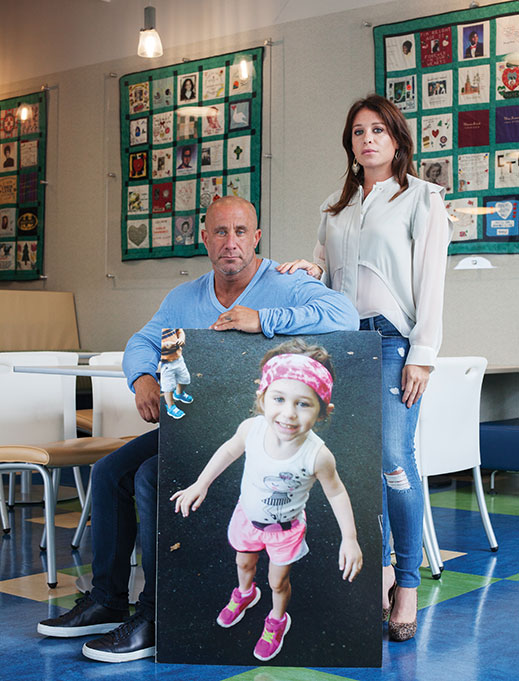PAGE THREE OF FOUR
The Giles family was familiar with the role of the Sharing Network. As a trauma surgeon in the emergency room, Randy had worked on organ transplantation cases himself; his father had been asked to sit on the board for the New Jersey Sharing Network earlier in the year before Randy’s passing. The two men had signed up to be organ donors together while at a basketball game. But the Giles family is an exception.

Mitch and Ali Kogen lost their 5-year-old daughter, Riley, unexpectedly in 2013. A tragic loss, Riley was able to live on by donating her kidneys, saving the lives of two women. The Kogens began a family fund called Riley’s Dance in 2014 to support organ recipients with medical bills. Photo by Allison Michael Orenstein
Mitch and Ali Kogen were not prepared to say goodbye to their little girl. Although their 5-year-old daughter, Riley, had been sick all her life due to panhypopituitarism—she had been born without a functioning pituitary gland—it didn’t make it any easier when tragedy struck the Essex County family one night in December 2013.
Riley had not been feeling well, but her mother says there were no red flags when they tucked her into bed. During the night, Riley’s fever spiked, and she suffered a seizure. When morning came, she was rushed to the hospital, but it was too late; Riley was in a coma.
“It was so devastating for us because we had so many trials, so many nights spent in the hospital, to have this one event, this one evening,” Mitch says. “And I was just thinking she was going to come out of it, because that’s just who she was. She was a fighter.”
The Sharing Network became involved when it became clear that Riley was unlikely to recover.
“New Jersey Sharing walked in, and they’re not clinical at all,” Mitch says. “[Their] first words were, ‘Hi I’m from New Jersey Sharing, tell me about your daughter—I understand what’s going on, but first and foremost, how are you?’ It put me in a very safe place, a very trusted place. They never made me feel as though it was some type of clinical decision.”
After some serious contemplation, the Kogens agreed to donate. Riley had been an empathetic and giving child. By allowing her organs to be harvested, the Kogens were told Riley could save the lives of two women who each needed a kidney.
“I think statistics sold me,” Ali says. “It’s such a unique situation and such an honor to be part of. For me, I couldn’t believe she was a candidate and would get this opportunity. It’s kind of amazing, that this kid could live on. And if you’re a spiritual person and you believe in life after death, it’s sort of amazing, because your relative gets to live on.”
Before they left the hospital, the Kogens decided to start a family fund in Riley’s name. Although they weren’t sure what the focus should be at first, it became clear to them when they learned the economics of organ donation.
All costs for donor families are covered by the Sharing Network. However, recipients must have their own means to pay for medical bills.
Prior to being entered on the organ transplant list, candidates must have insurance to cover the cost of surgery as well as postoperative medications. If a candidate is not insured, the transplant center will help them to obtain Medicare or Medicaid. Both government-funded programs offer assistance for organ and cornea transplants, although coverage varies. For example, some Medicare plans cover immunosuppressive drugs post-surgery for up to 36 months. However, a patient may need a lifetime of those drugs for their organs to function properly.
The Kogens, familiar with the high costs of medication because of Riley’s condition, decided to partner with the Sharing Network to support recipients of organ donation with medical bills.
“We knew we had a commitment to improving the lives of those who have received,” says Mitch. “The last thing you want to see is that your daughter gave her kidney, but it wasn’t taken care of properly by the recipient and it was lost.”
Riley’s Dance launched in 2014 with the mission of supporting recipient families in financial need pre- and post-surgery. In just under two years, the foundation has aided 30 families.
Additionally, all proceeds from the latest book in the series Lily’s Little Life Lessons, written by Rebecca Perlman Coniglio and aimed at teaching children about organ and tissue donation, benefits Riley’s Dance.
Many donor and recipient families support the mission of the Sharing Network through volunteer hours, participation in the annual Sharing Network 5K, or working on education outreach to spread the word about registration.
